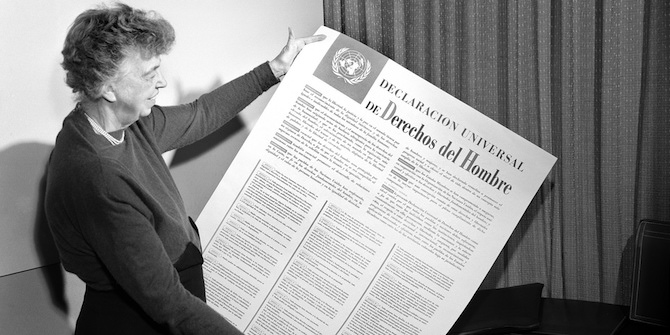by Eva Bellin, Brandeis University
This memo was prepared for ‘The Arab Thermidor: The Resurgence of the Security State’ workshop held at LSE on 10 October 2014 in collaboration with POMEPS.

In the wake of the Arab Spring, Tunisia and Egypt emerged as the two heretofore autocratic Middle Eastern countries with the greatest promise for successful transition to democracy. Both countries had successfully jettisoned longstanding autocratic leaders, both were endowed with strong and effective states, and both enjoyed a coherent and unified sense of national identity. But already by year three it was clear that the two countries were on very different tracks: Tunisia was successfully transitioning to democracy while Egypt was turning back to authoritarian rule. What explains their divergent trajectories?
One of the most conspicuous differences between Tunisia and Egypt lies in their socio-economic standing, with Tunisia enjoying greater wealth (measured on a per capita basis), a higher level of urbanization, a larger middle class, and a higher rate of literacy. Hence it is tempting to attribute Tunisia’s greater success at democratization to the country’s superior performance along standard indices of “modernization.” While I acknowledge the enduring insights of the modernization school, I reject the argument that structural factors of the socio-economic variety explain the divergent political outcome observed in these two cases. The different paths taken by Tunisia and Egypt were in no way “carved in stone” by socio-economic conditions. Rather, to explain Tunisia’s political success and Egypt’s failure one must look to other factors – some that are quasi-structural in that they are long-standing (although not necessarily socio-economic) and some that are much more contingent and located in agency-based factors such as leadership and strategic choice.
Inadequacy of structural or material explanations
Two observations discourage us from taking a purely structural or material approach to explaining the divergent trajectories of Tunisia and Egypt. First, although the correlation between economic development and sustained democracy is one of the strongest findings to come out of 40 years of democratization studies, four decades of such research has also revealed that there is no economic determinism governing democratic transition. There are countless examples of countries that have transitioned to and sustained democracy despite dire poverty and terribly low levels of development (e.g. Mongolia, India, and any number of sub-Saharan African countries). Conversely there are the many relatively well-developed countries in Latin America (Argentina, Chile) that sustained authoritarian regimes well into the 1980s long after their level of economic development might have led one to expect them to go democratic.
Second, both Tunisia and Egypt fall into the category of lower middle-income developing countries – a category that many analysts consider an “indeterminate zone” for democratic transition. Statistically the political trajectory of these countries can go either way. Clearly, other factors come into play to steer countries in either a democratic or authoritarian direction. What follows is the identification of six variables that played this key role steering Tunisian and Egypt along different paths.
>> read the full memo on the POMEPS website
Other available memos in the series
‘The Authoritarian Impulse vs. the Democratic Imperative: Political Learning as a Precondition for Sustainable Development in the Maghreb’, John P. Entelis, Fordham University
‘Elite Fragmentation and Securitization in Bahrain’, by Toby Matthiesen, University of Cambridge
‘Militaries, Civilians and the Crisis of the Arab State’, by Yezid Sayigh, Carnegie Middle East Center
‘Arab Transitions and the Old Elite’, by Ellis Goldberg, University of Washington
‘Is Libya a Proxy War?’, Frederic Wehrey, Carnegie Endowment for International Peace
‘Fiscal Politics of Enduring Authoritarianism’, Pete W. Moore, Case Western Reserve University
‘The Role of Militaries in the Arab Thermidor’, Robert Springborg, Sciences Po
‘Mass Politics and the Future of Authoritarian Governance in the Arab World’, Steven Heydemann, United States Institute of Peace
‘Security Dilemmas and the ‘Security State’ Question in Jordan’, Curtis R. Ryan, Appalachian State University
‘Authoritarian Populism and the Rise of the Security State in Iran’, Ali Ansari, University of St Andrews
‘A Historical Sociology Approach to Authoritarian Resilience in Post-Arab Uprising MENA’, Raymond Hinnebusch, University of St Andrews
‘The Arab Thermidor’, Marc Lynch, George Washington University





